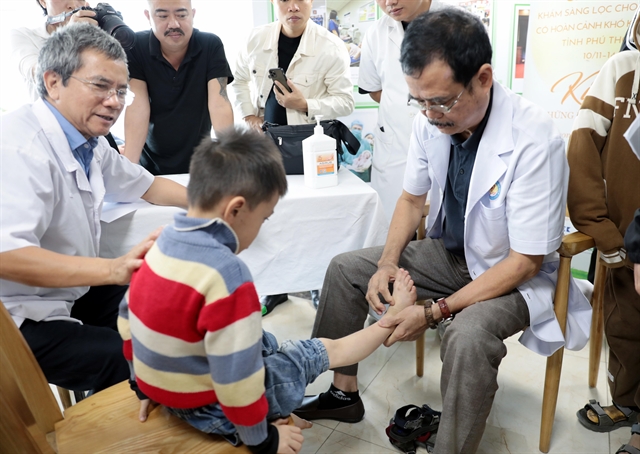 Society
Society

 |
| Phú Thọ Provincial Obstetrics and Paediatrics Hospital, Centre II of the Việt Nam Assistance for Handicapped Children Association, in coordination with the Phú Thọ Department of Health, organised a free medical examination and surgery programme for nearly 600 disadvantaged children with disabilities in the province. After the initial screening, 110 children were selected for surgical intervention. — VNA/VNS Photo Tạ Toàn |
HÀ NỘI — The Office of the Party Central Committee has released a notice on conclusions of Party General Secretary Tô Lâm following a working session with the Party Committee of the Ministry of Health and relevant central agencies on care and protection for children in special circumstances.
According to the notice, dated November 26, at the meeting on November 24, the General Secretary emphasised that children in special circumstances suffer multiple disadvantages in living conditions, nutrition, education and health care. Caring for them, he noted, is not only about alleviating present hardship but also about safeguarding the nation’s future and affirming the humanity of the socialist system.
To better care for the group of children, the leader assigned specific tasks to Party committees and organisations, and agencies at all levels.
First, the Party chief asked for measures to minimise new cases of abandoned children, stressing that this is the most fundamental and humane priority. Agencies must strengthen psychological and legal counselling, reproductive healthcare support and socio-economic assistance for high-risk groups, including women with unplanned pregnancies, single mothers, broken families and migrant workers in distress. Local Party committees and authorities must closely monitor disadvantaged households and provide timely support.
Second, it is necessary to ensure every abandoned child is promptly received and safely cared for. Hospitals, local authorities and public security forces must take responsibility where a child is found, strictly following procedures on initial healthcare, screening, handover and legal documentation. Any delay or negligence resulting in harm must be strictly handled.
Third, the General Secretary requested the renovation of care models and strengthen social protection facilities. The system should progressively shift from large-scale institutional care to family- and community-based models, with small home units and stable caregivers. Existing social protection centres must be upgraded in facilities, staffing and child-protection standards, while new centres should be developed in localities with high demand. Transparent social mobilisation mechanisms are needed to attract non-budget resources.
Relevant agencies need to focus on finalising an integrated process for detecting, receiving and providing initial care for abandoned children, linked to the national population database; developing appropriate education and integration programmes, ensuring full legal procedures for children to access social policies; preventing exploitation and abuse; and mobilising the public to support abandoned children and expand effective models such as “mentor mothers” and “safe houses”.
Particularly, he asked major cities, especially Hà Nội and HCM City, to take the lead in transitioning to new care models and preventing overload or the lack of responsibility in social protection facilities. — VNA/VNS




